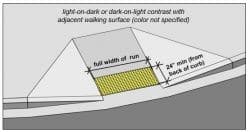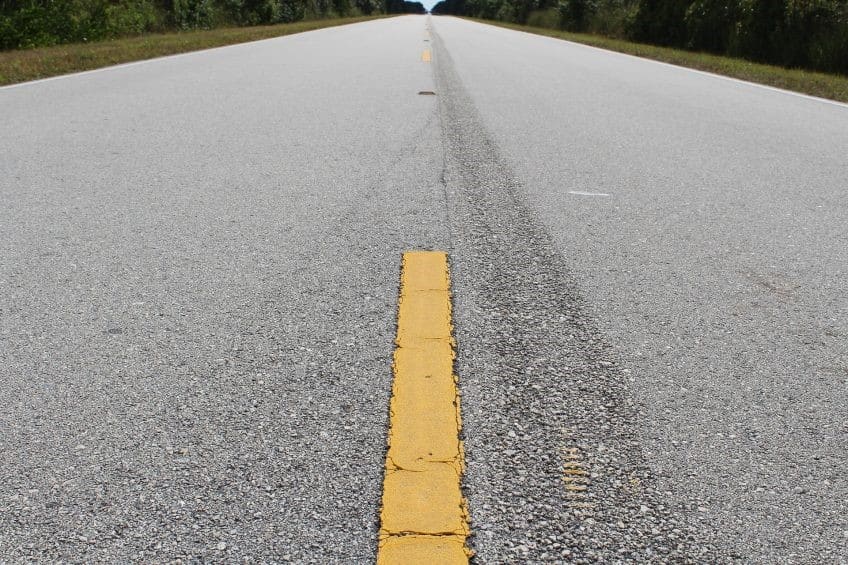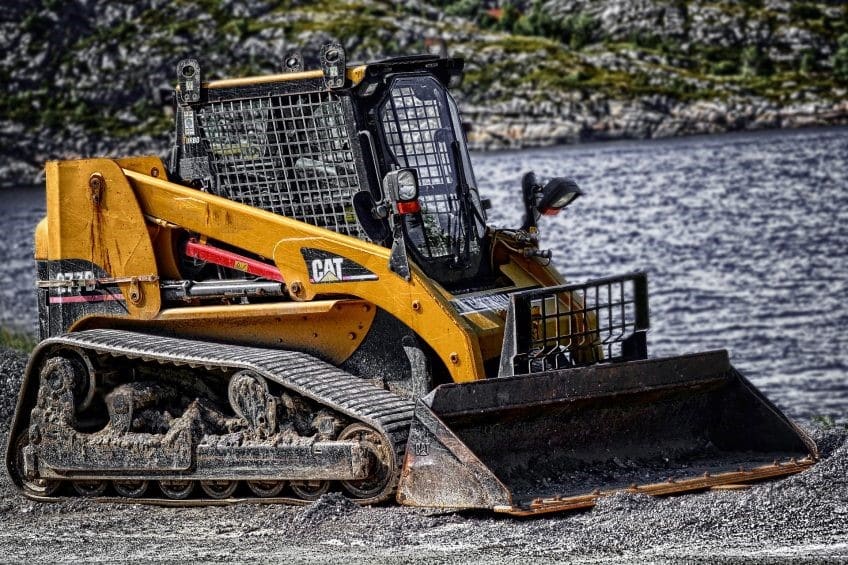Lakeland Slip and Fall Attorney
Slip and Fall Injuries From Dangerous Conditions
Premises liability law holds property owners responsible for injuries occurring on their property under certain conditions. In short, the injury must have been caused by a dangerous condition existing on the property (or, less commonly, by a dangerous activity that occurs on the property), and the landowner either must know or should have known about the hazard.
Slip and falls or trip and falls are one type of premises liability case. Common slip and fall or trip and fall injuries include concussions, broken wrists or arms, dislocated shoulders, twisted or torn knee ligaments, broken hips, and tailbone fractures. If you were injured in this manner, you should contact a Lakeland slip and fall attorney for a free consultation to discuss the merits of your case.
Types of Slip And Fall Cases
As experienced slip and fall attorneys in Lakeland, Florida, we evaluate many of the following types of slip and fall or trip and fall cases.
Liquid on the Floor
Perhaps the most common type of premises liability case involves a liquid spill on the floor, especially in retail businesses. Large retailers have protocols requiring an employee to walk the store every 20-30 minutes checking for liquid spills or other hazards; however, employees frequently disregard that policy.
You can frequently prove with surveillance video evidence that the retailer did not enforce its own procedures for a regular safety sweep of the store. When one of these stores refuses to produce the surveillance video, it is often because the video goes hours without an employee following the procedure.
Trip Hazards From Floor Mats And Runners
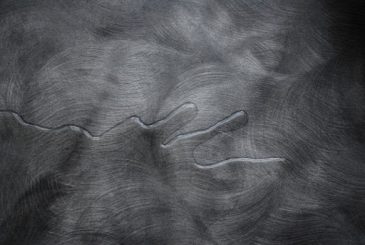 Floor mats and runners are part of a standard approach to minimizing slips and falls, particularly due to water. On wet days, a business should use a floor mat or runner where appropriate near the entrance to prevent water from being tracked in by customers. However, the floor mat itself can become a trip hazard if it is aged, curled up, or uneven.
Floor mats and runners are part of a standard approach to minimizing slips and falls, particularly due to water. On wet days, a business should use a floor mat or runner where appropriate near the entrance to prevent water from being tracked in by customers. However, the floor mat itself can become a trip hazard if it is aged, curled up, or uneven.
The National Safety Council has released a report outlining the proper use of floor mats to prevent trips and falls. In particular, with regard to commercial businesses, the rubber entry mat should:
- be wide enough to cover the entire doorway and long enough to absorb water or dirt from shoes
- go up to or about the doorway
- be a contrasting color (dark mat on light colored floors)
- be in good condition with the edges flush with the floor and no curled up sides
Remember the purpose of a floor mat is to reduce (not completely eliminate) a slippery condition on the floor. This is also why a wet floor sign should be used in combination with a floor mat for a commercial establishment.
Curb Ramps, Detectable Warnings, And Sidewalks
The United States Department of Justice has released guidelines on how to comply with ADA (Americans with Disabilities Act) standards.
One of the most common places where trips and falls occur is on a “curb ramp.” As shown in the picture, a curb ramp allows someone in a wheelchair to travel from a roadway onto the sidewalk. The sides should be “flared” appropriately according to ADA and building code requirements.
Upon inspection after a trip and fall incident, it is common to find that the flared sides of a curb ramp are out of compliance and improperly sloped. Another common problem with the flared sides occurs when the business owner has painted the sides with regular paint as opposed to slip resistant paint. In wet conditions, this makes stepping up on the curb or the angled edges slippery and dangerous.
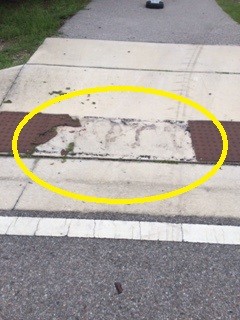
Broken Detectable Warning
The ADA standards also require a “detectable warning” at the bottom of a curb ramp to provide a tactile warning before entering the roadway. This feature not only helps a blind person sense the edge of the roadway, but it also helps everyone pay closer attention to their surroundings. These detectable warning features must also be maintained in a reasonably safe condition: without shattered or broken edges or exposed bolts, for example. A worn, broken, or defective warning mat may cause a person to trip and fall.
An ADA violation may be used as evidence of negligence and may be a solid basis for a personal injury lawsuit.
Broken And Uneven Sidewalks
Broken and uneven sidewalks are another trip and fall hazard due to settling of the ground or tree roots growing underneath the sidewalk. A business, government entity, homeowner’s association, or homeowner can be sued for a broken or uneven sidewalk that causes injury.
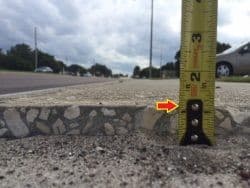
Sidewalk with Improper Change in Level Exceeding 1/4″
ADA accessibility standards require that a sidewalk with a change in level can be up to 1/4″ on any accessible route for ingress or egress. Anything greater than 1/4″ up to 1/2″ must be ground down with a 1:2 slope. Any change in level greater than 1/2″ may require removal and replacement with a ramp or a new section of sidewalk.
Negligent Mode of Operation
A frequently forgotten cause of action in premises liability cases is the theory for a “negligent mode of operation.” This cause of action is different from a property owner’s duty to maintain the property in a reasonably safe condition. Instead, a negligent mode of operation refers to the way that a business conducts its operations and whether the business can and should do anything to make it safer. This issue was addressed in Khorran v. Harbor Freight Tools, Inc., Case No. 3D17-1508 (Fla. 3d DCA 2018).
An example of a case for negligent mode of operation is a business placing commonly purchased items on top shelves that require a ladder or in a location where other items might get knocked off.
In such a case, the jury has to determine whether the business is negligent in stacking items on a shelf at a particular height, in a particular manner, and at a particular location. See Klaue v. Galencare, Inc., 696 So. 2d 933 (Fla. 2d 1997). From a commonsense standpoint, if there is a better way to place items on shelves where the risk of injury is lower, then a business should do so.
Will My Case Succeed?
 Successful slip and fall or trip and fall cases must prove four elements, all based on tort law: (1) the property owner has a legal duty to the slip and fall victim; (2) the condition that caused injury was dangerous, not minor or insignificant; (3) the property owner knew or should have known about the dangerous condition; and (4) the dangerous condition caused injury.
Successful slip and fall or trip and fall cases must prove four elements, all based on tort law: (1) the property owner has a legal duty to the slip and fall victim; (2) the condition that caused injury was dangerous, not minor or insignificant; (3) the property owner knew or should have known about the dangerous condition; and (4) the dangerous condition caused injury.
When you consult a slip and fall attorney in Lakeland, Florida, you and your lawyer will discuss each of these elements carefully to determine whether your case is likely to succeed. For instance, your slip and fall lawyer might analyze some of the facts of your case as follows.
Statutory and Common Law
Your slip and fall attorney will check all applicable Florida laws, including statutory, regulatory, and common (or case) laws. One statute applicable to a spilled liquid case, for example, is found in section 768.0755, Florida Statutes. That statute requires the slip and fall party suing to prove that the business “had actual or constructive knowledge of the dangerous condition and should have taken action to remedy it.”
Actual Or Constructive Knowledge Of The Dangerous Condition
Actual knowledge of a dangerous condition is rare as most owners would remedy a known dangerous situation. On the other hand, constructive knowledge has gotten harder to prove under the statute as the plaintiff must show with circumstantial evidence that “the dangerous condition existed for such a length of time that . . . the business establishment should have known about the condition; or the condition occurred with regularity and was therefore foreseeable.”
Several examples help to explain what the statutory language means. Imagine that a customer in a grocery store drops something on the floor. You twist your ankle when you step on the object, which then causes you to fall and break your wrist. You must be able to prove that the item sat on the floor long enough that the business owner should have known about it and should have done something about it. Next imagine that a business’s roof leaks every time it rains. As you’re moving toward the paper towel aisle in your local big box store, you slip and fall on a rainwater puddle, hitting the back of your head when you land. Such facts likely would fall under the statute’s language that the dangerous “condition occurred with regularity and was therefore foreseeable.” That is, the business owner should foresee that a danger is created every time it rains and should have the leaky roof repaired.
These principles of liability apply to all businesses. Every business establishment has a duty to ensure (within reason) the safety of its property for all visitors, whether they are customers, clients, vendors, or someone else who has entered onto the property legally.
Could My Case Fail?
The law allows the property owner some defenses to liability, elements your Lakeland slip and fall attorney will also discuss with you.
Open And Obvious Defense
Almost all slip and fall or trip and fall cases will be defended by the property owner by claiming that the injured person was negligent, causing their own fall, and that any defect in the property was open and obvious. “Open and obvious” means that it is a condition that should be easily detectable with the use of ordinary care.
A number of cases have addressed what is open and obvious under the circumstances, however, most cases are factually unique. This is why you should have professional legal counsel to help determine whether you have a case. The condition upon which you fell may be an ADA or building code violation, despite being open and obvious, and may defeat the defense because ADA standards and building codes are meant to protect the public from harm (protected class).
“The Contractor Did It” Is Not A Defense For The Owner
Many business owners think that they are off the hook for dangerous conditions on their property simply because they hired a contractor to do the work and because the city or county permitted or approved the work.
In Florida, the property owner is responsible for a construction defect after accepting the work from the contractor. See Slavin v. Kay, 108 So. 2d 452 (Fla. 1958). Under Florida’s “Slavin doctrine,” a contractor, subcontractor, architect, or engineer is not held legally responsible after their work has been completed and accepted by the property owner even if the property owner has no knowledge of the construction defect.
After work has been completed, legal liability rests on the property owner to perform regular inspections of their property and to look for latent defects that may cause injury. These claims are typically paid from the business’s commercial general liability policy.
What Steps Should I Take After My Slip and Fall Accident?
 If you have slipped and fallen or tripped and fallen at a business (including a grocery store or big box store), taking the following steps will improve your chances to successfully recover damages. A slip and fall lawyer in Lakeland, Florida, can help you decide what additional steps to take.
If you have slipped and fallen or tripped and fallen at a business (including a grocery store or big box store), taking the following steps will improve your chances to successfully recover damages. A slip and fall lawyer in Lakeland, Florida, can help you decide what additional steps to take.
- Take pictures of the floor in the area of where you fell (make sure to include the substance that caused you to slip) because once you leave, the area will be cleaned up.
- Take pictures of your shoes and clothes, including soaks and stains, with the substance that caused you to slip.
- Keep or take pictures of your receipt to prove that you were at the business.
- Don’t give or write a statement unless the business is willing to give you a copy of your statement.
- Keep all photographs, written statements, shoes, and clothing to avoid any arguments about a spoliation of evidence.
- Go to an Emergency Room or urgent care clinic for medical assistance.
- Finally, call an attorney for help with your case.
COVID-19 Transmissibility Claims
Florida passed sweeping and broad COVID-19 immunity for businesses in March 2021. Many businesses provide signs warning of the possibility that COVID-19 can be transmitted through the air on premises. Some even disclaim liability. The immunity passed by Florida makes it difficult to make a claim for negligence in failing to protect against the spread of the virus.If you have questions about whether premises liability law applies to your COVID-19 infection, contact a slip and fall lawyer in Lakeland, Florida, and its surrounding towns.
Hire an Attorney For Your Slip And Fall Injury Today
If you or a loved one have suffered an injury as a result of a premises liability issue, please contact a local slip and fall attorney in Lakeland, Florida, to discuss the facts of your case. A consultation with a slip and fall lawyer at Russo Law is free. Please call to set up your appointment with an attorney.
Click here for directions with Google Maps
Check Out Our Blog
For recent legal topics, please see our personal injury blog or read our answers to frequently asked questions. We help clients located in Polk County, including Lakeland, Winter Haven, Bartow, and Haines City, Florida who have injuries as a result of a slip and fall or dangerous condition on the premises of a business.
